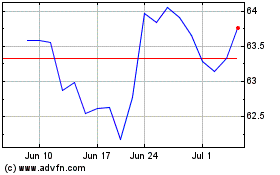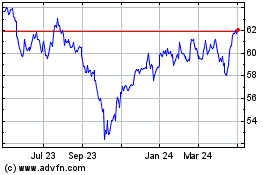By Jared Diamond and Louise Radnofsky
Major League Baseball is moving this summer's All-Star Game and
amateur draft out of suburban Atlanta in response to Georgia's new
voting law, which has been criticized by civil-rights groups as an
effort to suppress minority voters by making it more difficult for
them to cast ballots.
It is the first major event to be pulled from the state, coming
days after Atlanta-based corporations Delta Air Lines Inc. and
Coca-Cola Co. expressed their opposition to the law. The law's
backers say the changes are needed to preserve election
integrity.
In a statement Friday, MLB commissioner Rob Manfred said that
after discussing the matter with teams, the players' union and
current and former players, he "decided that the best way to
demonstrate our values as a sport" is to relocate the event, one of
the most prestigious on the sport's calendar. A new host city has
not yet been finalized.
"Major League Baseball fundamentally supports voting rights for
all Americans and opposes restrictions to the ballot box," Manfred
said. "Fair access to voting continues to have our game's
unwavering support."
This year's All-Star game was set up to be a particularly
poignant one in the city where baseball legend Hank Aaron played
much of his career. Aaron, the slugging outfielder who endured a
barrage of racism on his way to surpassing Babe Ruth all-time home
run record during his 21 seasons with the Braves, died earlier this
year. This would have been the first All-Star Game in the Atlanta
area since 2000, and the first at Truist Park, the Braves' home
stadium since 2017.
But the controversy swirling around the law had mounted in
recent days, particularly when President Joe Biden said he was in
favor of pulling the game. That came in an interview with ESPN just
as this 2021 MLB season was set to start, fueling pressure for the
league to take action. (Aaron will be celebrated at the relocated
All-Star festivities, Manfred said.)
"This was neither our decision, nor our recommendation, and we
are saddened that fans will not be able to see this event in our
city," the Braves said in a statement. "Unfortunately, business,
employees and fans in Georgia are the victims of this
decision."
The Republican-backed Georgia voting rules require absentee
voters to request ballots by providing their driver's license
number, the last four digits of their Social Security number or a
copy of some other accepted form of identification. They also have
to provide this information when they mail in their ballots. Under
prior rules, people signed an absentee-ballot application and
signed an inside envelope containing the ballot when they mailed it
in.
The law also places new limits on how parties and voting groups
mail out absentee-ballot request forms, and limits the number of
ballot drop boxes to one per county except for large counties,
which can set up one box for every 100,000 registered voters. The
law is far less extensive than numerous bills that were initially
proposed by GOP state lawmakers.
Republican legislators in Georgia have said new voting rules are
needed, in part to assure the public that voting is fair and to
ease concerns there might have been fraud this past election
season. Republican Gov. Brian Kemp, Georgia's secretary of state
and other Republican officials also affirmed the integrity of the
state's 2020 presidential election after conducting two statewide
recounts and a partial audit of mail-in votes in one county.
Kemp has brushed off criticism of the law. "I'm glad to deal
with it," he said on Wednesday in an interview on CNBC. "If they
want to have a debate about the merits and the facts of the bill,
then we should do that."
The decision also comes after a year when sports fields, more
than ever, became political auditoriums. In the wake of the killing
of George Floyd and other unarmed Black men and women, athletes in
sports across the country used their platforms to protest and call
attention to social justice issues during the heat of an election
cycle.
It's not the first time that state politics have prompted a
professional sports league to change its All-Star plans.
In July 2016, the NBA pulled its All-Star Game scheduled for
February 2017 from Charlotte, N.C. in response to a controversial
state law mandating that transgender people use bathrooms
associated with their birth gender when in public buildings and
schools. The game was moved to New Orleans. The NBA went to
Charlotte for All-Star festivities in 2019 after the bill was
repealed.
Baseball has been slower to wade into social issues compared to
other sports, making this an uncharacteristically aggressive
statement for the league. When kneeling and other forms of protest
during the national anthem became widespread in the NFL and NBA,
baseball players largely avoided public demonstrations and rarely
expressed any political views. About 8% of MLB players are Black,
down from nearly 20% in the 1980s.
Calls for boycotts over lightning-rod state laws have become a
particularly popular tactic in recent years, with sporting events
one of the highest-profile catches for activists.
The National Collegiate Athletic Association also agreed to
withhold events from North Carolina over the so-called bathroom
bill, and brought pressure in its home state of Indiana over a
religious-objections law. Arizona became a widespread target over
an immigration law.
The controversy over the voting law began prompting calls from
Democratic politicians and liberal advocates to MLB to do the same.
Biden, in the televised interview earlier this week, said he would
"strongly support" a decision by the league to pull the game.
The idea of a statewide boycott for these types of events hasn't
received universal support, even from those who staunchly oppose
the law.
"I absolutely oppose and reject any notion of boycotting
Georgia," Democratic Georgia senator Jon Ossoff said in a statement
prior to MLB's decision. "Georgia welcomes business, investment,
jobs, opportunity, and events. In fact, economic growth is driving
much of the political progress we have seen here."
--Andrew Beaton contributed to this article.
Write to Jared Diamond at jared.diamond@wsj.com and Louise
Radnofsky at louise.radnofsky@wsj.com
(END) Dow Jones Newswires
April 02, 2021 16:34 ET (20:34 GMT)
Copyright (c) 2021 Dow Jones & Company, Inc.
Coca Cola (NYSE:KO)
Historical Stock Chart
From Mar 2024 to Apr 2024

Coca Cola (NYSE:KO)
Historical Stock Chart
From Apr 2023 to Apr 2024
